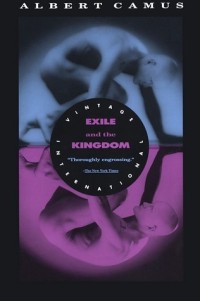
Exile and the Kingdom
تأليف : Albert Camus
النوعية : مجموعة قصص
نعتذر، هذا الكتاب غير متاح حاليًا للتحميل أو القراءة لأن المؤلف أو الناشر لا يسمح بذلك في الوقت الحالي.
حفظ
Exile and the Kingdom by Albert Camus These six stories, written at the height of Camus' artistic powers, all depict people at decisive,
revelatory moments in their lives. Translated from the French by Justin O'Brien.The six works featured in this volume are: "The Adulterous Woman" ("La Femme adultère") "The Renegade or a Confused Spirit" ("Le Renégat ou un esprit confus") "The Silent Men" ("Les Muets") "The G These six stories, written at the height of Camus' artistic powers, all depict people at decisive, revelatory moments in their lives. Translated from the French by Justin O'Brien.The six works featured in this volume are: "The Adulterous Woman" ("La Femme adultère") "The Renegade or a Confused Spirit" ("Le Renégat ou un esprit confus") "The Silent Men" ("Les Muets") "The Guest" ("L'Hôte") "Jonas or the Artist at Work" ("Jonas ou l’artiste au travail") "The Growing Stone" ("La Pierre qui pousse")
Exile and the Kingdom by Albert Camus These six stories, written at the height of Camus' artistic powers, all depict people at decisive,
revelatory moments in their lives. Translated from the French by Justin O'Brien.The six works featured in this volume are: "The Adulterous Woman" ("La Femme adultère") "The Renegade or a Confused Spirit" ("Le Renégat ou un esprit confus") "The Silent Men" ("Les Muets") "The G These six stories, written at the height of Camus' artistic powers, all depict people at decisive, revelatory moments in their lives. Translated from the French by Justin O'Brien.The six works featured in this volume are: "The Adulterous Woman" ("La Femme adultère") "The Renegade or a Confused Spirit" ("Le Renégat ou un esprit confus") "The Silent Men" ("Les Muets") "The Guest" ("L'Hôte") "Jonas or the Artist at Work" ("Jonas ou l’artiste au travail") "The Growing Stone" ("La Pierre qui pousse")
المزيد...



